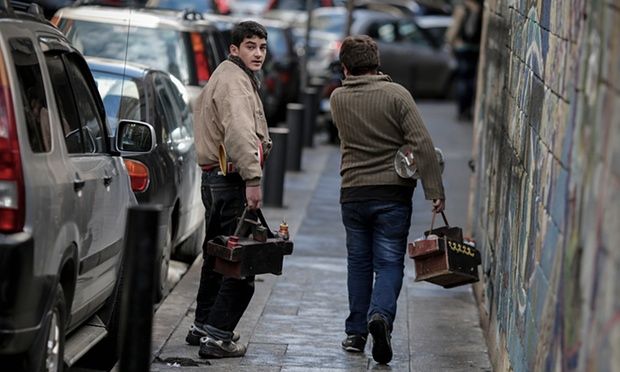
The Guardian
On a Friday night in Beirut, tiny figures weave in and out of the traffic between moving cars. They stand on tiptoes to peer through vehicle windows in an attempt to charm drivers out of a dollar or two.
The children are Syrian refugees, often the sole breadwinners for their families, working through the night selling flowers and shining shoes. They come from families stuck in limbo in Lebanon, and whose parents desperately want to go back to Syria.
A group of young boys between 11 and 19 seem to have marked their territory along the stretch of bars and restaurants between the Gemmayzeh and Mar Mikhael neighbourhoods in the north-eastern part of the Beirut.
One of them, Abdullah, smokes heavily but still sucks his thumb. He alternates between the two habits while tucking a plastic container of crumpled flowers under his arm. He says he is 13 but looks much younger as he recalls his first night selling flowers in Beirut, after fleeing his home in Aleppo with his family nearly five years ago.
“I was scared that someone would come and rob me or do something to me,” he says. “I was shy and embarrassed. If I saw a couple kissing I used to close my eyes, but now I am used to it.”
Abdullah’s brother Aboudi is a year older and is never too far away. He has a curly red ponytail that customers stroke as he tries to sell them flowers.
“We used to have a good life in Syria. We had friends, life had meaning. I would love to go back to Syria,” he says.
“My grandmother is still there. I have two uncles. One of them is dead and the other is kidnapped. We don’t know if he’s dead or not.”
While the flow of Syrians to Europe continues, Lebanon remains second only to Turkey in terms of the size of its Syrian refugee population.
The plight of those who have fled the war is obvious in Beirut. Women with toddlers beg silently in the city centre. Little girls tap on car windows in the hope of getting a few coins. Families have squeezed into poor areas of the city, erecting makeshift housing in places such as Ouzai and under Cola Bridge.
As night falls, the flower sellers take to the streets. Aboudi, Abdullah and about six or seven other young boys loosely congregate around an older Syrian boy who calls himself Double A.
“I met the boys Aboudi and Abdullah and started to teach them what’s right and what’s wrong, and over time I became the boss, not like a gangster, a boss that guides kids and tells them what to do,” he says.
Like many Syrians pouring into Lebanon, Aboudi and Abdullah’s father has been unable to find work. On a good night the boys can make up to £10.
The brothers have different selling styles. Aboudi is shy and softly spoken, while Abdullah throws his arms around the waists of passing partygoers to try to get a sale. Often he is shoved aside, but he quickly recovers to ping pong between the cars and punters again.
Abdullah seemed proud of the savvy he has been forced to develop from his nights working. “I became tough because I’ve been working for five years and all the people are my friends, including the police and the intelligence,” he said.
Faris al-Khodor, one of the group, went missing recently, returned to Syria and never came back. The boys found out that he had been killed in a US airstrike.
“I love him very much … I don’t think he’s dead,” says Aboudi. “His parents are hiding him, or they spread a rumour he’s dead on the computer, the internet, Facebook or something … I don’t know, but he should not have died.”
Double A starts to sing a song he wrote after Faris died: “Come back again my bro, and help me with the flowers … ”
The boys are quiet for a moment and then slowly scatter back to the street get back to work.



